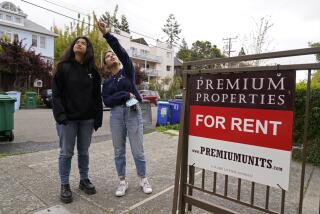UCLA still foresees no recession
Under pressure from falling home values, high oil prices and rising unemployment, the economy in California and the nation will perform anemically in the coming months -- but there still wonât be an actual recession, UCLA forecasters say.
âI am holding on to what is now a shaky view: no recession this year,â said economist Edward Leamer, director of the quarterly UCLA Anderson Forecast, which is being released today.
The predictions, however, call for somewhat more pain in the months ahead than previously forecast, with little improvement this year or next.
Not good, but not a recession, which is commonly defined as two consecutive quarters of negative growth in gross domestic product.
âIn a recession, things happen quicker and nastier,â said David Shulman, a senior economist at UCLA.
Normal growth will not resume until 2010, Shulman said.
âThe witchâs brew of the popping of the housing bubble, a wounded financial system and increasing inflationary pressures coming from rising commodity prices will keep the economy on a sub-prime growth path for the next several quarters,â he said.
The drag on the economy from the buckling housing industry may become the most severe since the Great Depression, the report said. There will be little or no growth in gross domestic product this quarter, and GDP will probably slip into negative territory in future months before finishing next year with a tepid average improvement of 1.2%.
A key factor in favor of the economy, the forecast says, is that so far the pounding of the housing market has not badly damaged the job market.
In the 1990s, Southern California home values fell after many workers -- particularly in the aerospace and defense industries -- lost their jobs and couldnât keep up mortgage payments. Foreclosures peaked in 1997, when employment already had recovered, because many homeowners had struggled for months to hang on.
âThis time, what happens in housing stays in housing,â Leamer said, as many employers worried about the economy hold off on new hires but decline to cut staff.
Many homeowners are choosing to sell their houses at a loss and move -- not because they lost their jobs, he said, but because they owe their lenders more money than their houses are worth.
Bailing out makes financial sense to them. âThe lenders have provided an option to walk away if things go bad -- you might as well exercise that option,â Leamer said.
Distress sales will continue to wreak havoc on home valuations for the rest of the year, the forecasters said.
In Lancaster, for instance, deeply discounted foreclosure-related sales account for about eight of 10 transactions, said real estate agent James Malanowski of Coldwell Banker. The upside is that the vast majority of sales are to first-time home buyers who previously had been priced out of the market.
âBuyers are out there buying again,â he said. âWe have a huge inventory.â
Therein lies one of the silver linings to the precipitous drop in home prices, the report said. UCLA forecasters predict that distressed home sales will continue for an additional nine to 12 months. The remainder of 2009 will be devoted to picking up the pieces and watching to see how home prices level out when the market isnât dominated by foreclosures.
âThe unprecedented speed of the price adjustment means that instead of several years of slow bleeding [like the 1990s] we have compressed the necessary adjustment into two years of intense housing pain,â wrote UCLA economist Ryan Ratcliff. âMom always said itâs better just to rip the Band-Aid off.â
The decline in house prices, however, has wiped out about $3 trillion in home equity nationally and helped crimp consumer spending.
Sales of durable goods, such as automobiles, will stay soft as $4-plus gasoline weighs heavily on household budgets and keeps sucker-punching the U.S. economy.
In years past, the cost of crude oil imports ate up about 1% of the nationâs GDP, forecast director Leamer said. Now itâs eating up 3%. âThatâs a heck of a lot of money leaking out of the borders of the U.S.â
Itâs also a bracing slap to American consumers, who need to pay heed, Leamer said.
âThe global economy is communicating to Americans that we are not as wealthy as we thought we were and we are racing global competition for scarce resources,â he said.
âItâs saying we need to save more as a society and the government needs to be more forward-looking. We are not having sensible debate about the long-term fate of the economy.â
--
More to Read
Inside the business of entertainment
The Wide Shot brings you news, analysis and insights on everything from streaming wars to production â and what it all means for the future.
You may occasionally receive promotional content from the Los Angeles Times.











